May 13, 2019 | DIY
As long as we are talking about DIY weddings and food (see previous posts on catering, dessert, and cake), let’s also talk about DIY dishes.
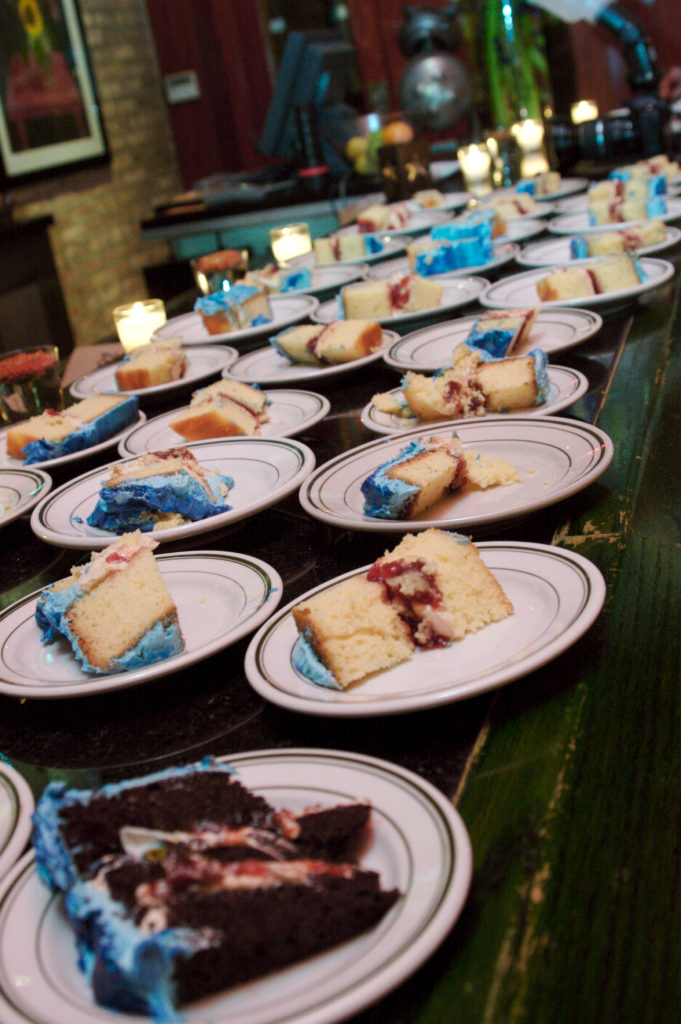
Just how many plates does one couple need?? Photo courtesy of Artisan Events.
When you see the total cost of rental dishes, you might be tempted to go to Ikea and buy dishes instead of renting them. Depending on your circumstances, that might be a good choice–or it really might not be.
I know someone who bought enough dishes to serve about 50 people at her wedding. They got married in their own home, had a good caterer, and had places to store all those dishes after the wedding. It can work.
On the other hand, if you are having 150 guests at a rented venue, you might run into some unexpected difficulties. For example, keep in mind that everything may need to be washed before it is used. Your catering staff probably won’t do that for you without an additional charge. Next, think about what will happen to all those dishes at the end of the night. The kitchen staff will scrape them and pack them up in whatever boxes you provide for them. Then you or your representative will have to pick them up from the venue the day after the wedding (or take them home that night). And then someone will have to wash all of them. Ever done dishes for 150 people? It’s not fun. After that, you’ll still have to figure out what to do with 150 place settings. That might not be how you planned to spend the first day or two of your honeymoon.
And don’t forget that you’ll probably need serving dishes, as well. A lot of them!
This is not to say you shouldn’t buy dishes, but you should definitely think it through all the way to the end before taking the leap. It’s not the right choice for most weddings.
May 6, 2019 | DIY
So, last week I wrote about sweet tables. What about DIY wedding cakes?
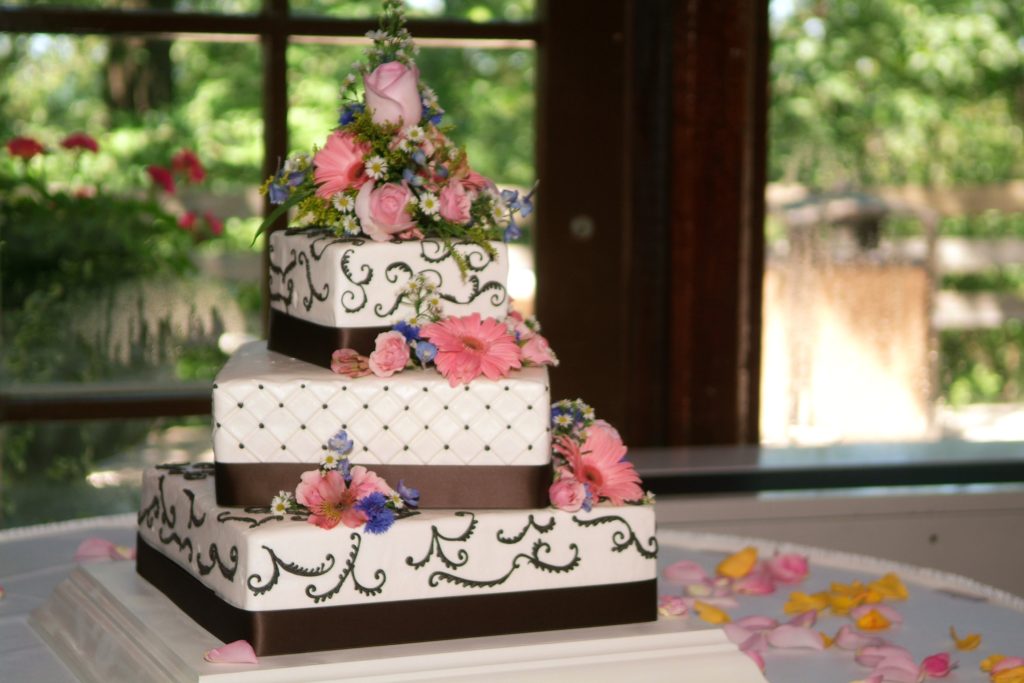
Photo by Magical Moments Photography.
Considering how expensive wedding cakes can be, maybe you want to try your hand at baking your own. There is certainly a lot of information on the internet about how to bake a wedding cake. Some of the sites even say it is “easy.” I won’t pass judgment on that, since I’ve never tried it. What I have seen is the results.
Before I tell you about the home-made cakes I’ve seen, I have to point out that sometimes even professional bakers have cake disasters. So, amateurs should be aware of the pitfalls–and remember to freeze your cake if it is a hot day.
My experience is that home-made cakes are likely to be a little more rustic than cakes made by professionals. This may suit your aesthetics exactly, in which case feel free to ignore anything else I say.
Here is a sweet and wonderful cake baked by the bride’s sister.
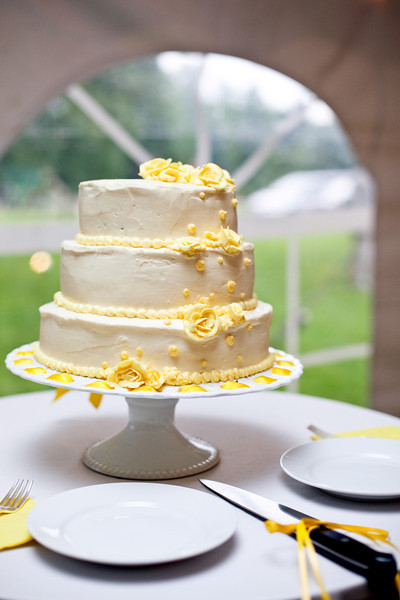
Image by theblondephotographer.com.
It is a perfectly lovely cake after its own fashion and suited their country-themed outdoor wedding reception. It might have been out of place at an ultra-formal downtown reception, though.
And here is a fun one baked by the groom’s family.
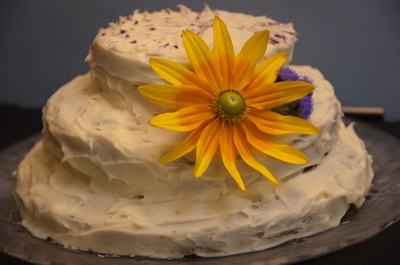
Photo by Magical Moments Photography
The bride and groom wanted to use the family recipe for carrot cake for their wedding cake. This was a highly informal wedding and reception, and the cake fit right in. Again, it might have been out of place elsewhere.
Here is one more example that is slightly different:
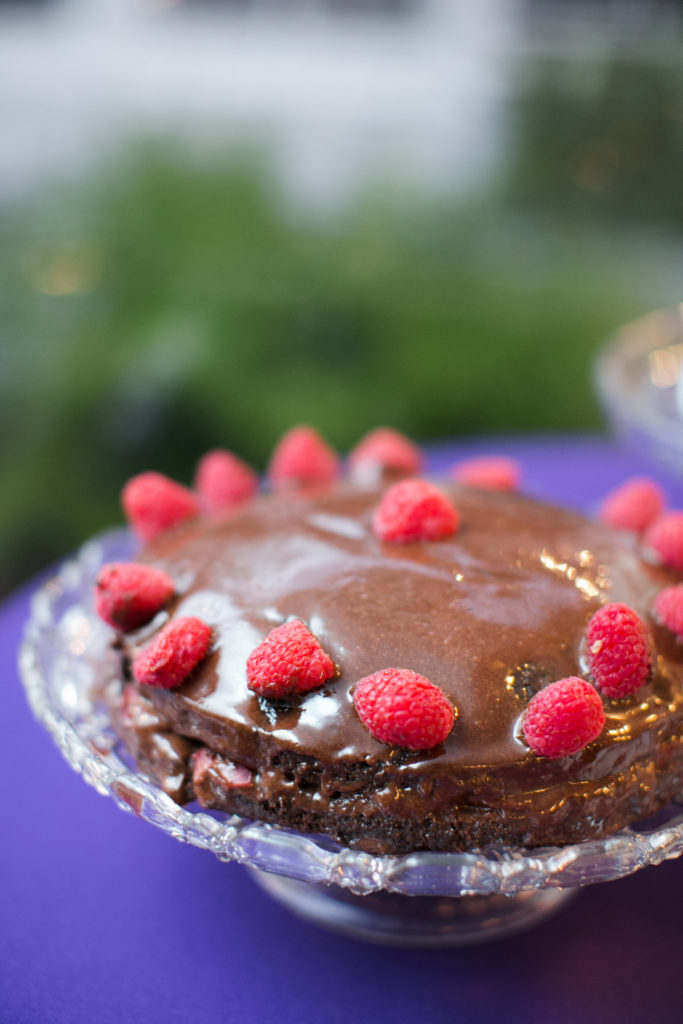
Photo courtesy of ChristyTylerPhotography.com
The bride and groom at this wedding both had tremendous food allergies. Instead of asking a professional baker to work around their allergies (wheat, sugar, dairy, etc.) and try to come up with a recipe that would be delicious, the groom’s mother made a number of cakes from a recipe they already knew would work for them. They didn’t insist on a tiered cake but enjoyed them as regular cakes. This was a case where DIY made a lot of practical sense.
My short recommendation would be that DIY wedding cake is not impossible. The important thing to keep in mind is that the visual results may be different from what you would expect from a professional. It is probably also wise to learn some of the tricks of stabilizing and transporting tiered cakes to prevent disasters. You might also have to make more than one, in order to try out your skills. (Bonus: extra cake!) If you’re willing to take these risks, go ahead and make your own cake. If not, there are a lot of really good bakers who will be happy to do the job for you.
Apr 29, 2019 | DIY
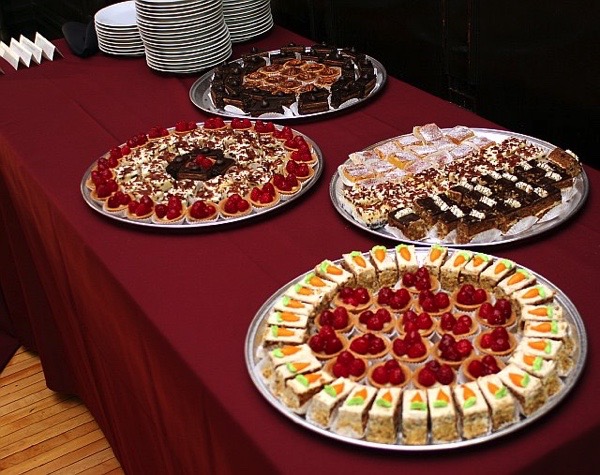
The home-made sweet table can be both pretty and tasty
Here’s a DIY idea that actually works: Dessert! While I strongly recommend that you do not cater your own wedding, dessert is a completely different matter for doing it yourself. Better yet, get other people to do it for you.
I’m not talking here about making your own wedding cake. While I’ve seen cakes made by talented friends and family members, that’s a job that is probably best left to professionals. (See next week’s post on just this subject.) I’m talking about sweet tables.
We all know people who make fabulous cookies or pies or cupcakes. You can take advantage of this by asking people–instead of bringing gifts–to bake for your wedding reception.
DIY sweet tables, like all DIY projects, do require a little more advance planning and coordination. You’ll need to ask people enough in advance so that they will have time to bake. Your caterer will need to be alerted to the DIY nature of dessert. People who bake will need to drop off their baked goods at a specified time. (Your coordinator and caterer will help determine the right time.) You’ll probably want to coordinate your bakers so that you have some variety. It’s also a good idea to have your volunteer bakers include a list of ingredients with their baked goods so that people with allergies can find out what is in each dessert. And you’ll have to be sure the quantity is sufficient.
If you feel like you can handle all these things, the DIY sweet table is definitely an option. It might not be as fancy as a sweet table from a bakery, but it can save money and be a way to have your friends and family closely involved with your reception.
Apr 22, 2019 | DIY
I’ve written a bunch of articles in DIY weddings, and I want to share them with you again–in case you missed them before. The first one is about catering.
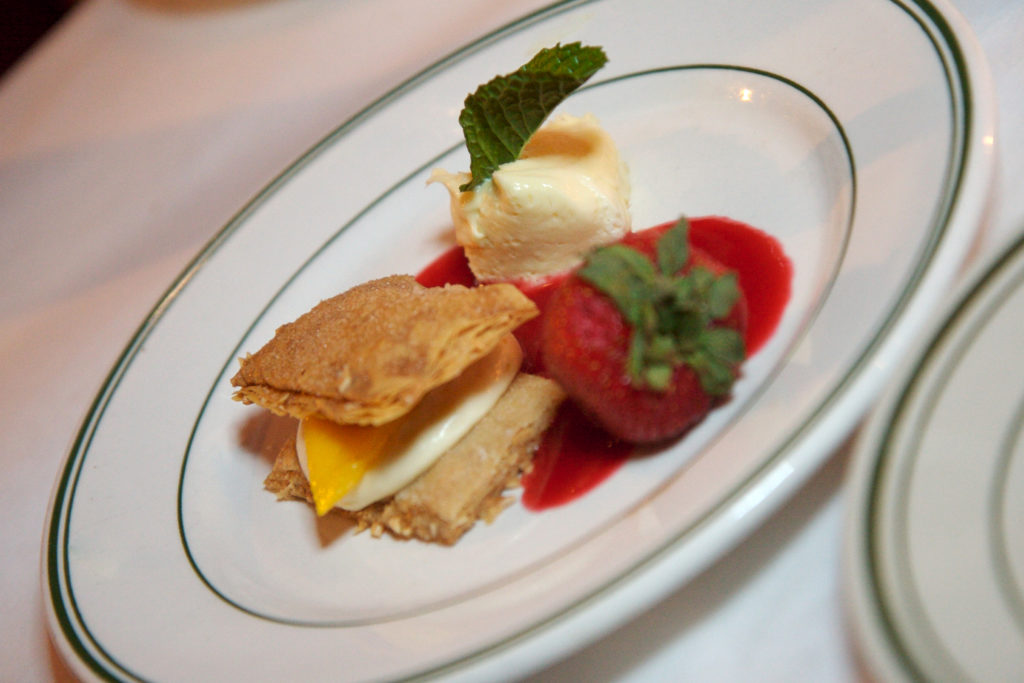
Don’t take for granted professional presentation of the meal. Photo courtesy of Artisan Events.
Of all the things you might want to do yourself for your wedding, the one I would recommend against without hesitation is catering your wedding reception yourself. You might think this would be obvious, but I have talked to people who thought they could do it.
I have actually heard of self-catered weddings that were pulled off with a lot of help from friends and family. I know it can be done, especially if there are people with special skills involved. So, I won’t say you should never, ever do it. I’m just going to give you a lot of reasons not to.
Caterers do a lot more than cook in quantity. They also manage the kitchen; order and return rental items; keep the food (and so your reception) on schedule; hire and manage serving and bar staff; set up tables, chairs, and linens; set the tables; and clean up and take the garbage out. Caterers also have food sanitation licenses, meaning there is a low probability of spoiled food or food poisoning from their kitchens. They know how much ice to buy and bring. Some of them own serving equipment that they provide at no charge. And that is just the minimum of what a professional caterer has to offer.
On your wedding day, you are going to be very much occupied with, first, getting married. Second, you will want to spend as much time as possible greeting your guests. You’ll probably also want to have your photograph taken with many of your friends and family, not to mention with your spouse. These things will take up most of your day, leaving you no time to be the caterer at your own wedding.
I would say that unless you are able to provide everything a caterer brings to the table, and unless you can also delegate all the catering on the wedding day to a trusted party, hire a professional and save cooking for a crowd for another day.
Mar 27, 2017 | DIY
Today’s DIY topic is: Photography. I’ve updated the original post a little here.
You might look at the cost of professional photography (which can run from $1,500 on the very low end to over $6,000 on the high end) and you might think you’d be better off without a professional photographer. You might be right. Or you might be very disappointed. It all depends on how important photos are to you.

Here’s a photo I took with my point-and-shoot camera and limited photography skills.
If having high quality photos of your entire wedding and reception is not your first priority, you can ask a friend or relative to document the day for you. Someone with good photography equipment can probably take decent photos for you.
But if having professional quality photos is important, it’s difficult to get them without paying professional prices. Professional wedding photographers have equipment and skills that ordinary mortals lack. The best consistently take copious, excellent photos that capture the essence of your day. They are on the spot and work hard so they don’t miss any important moments. It’s also important that they are not guests, but are hired to work for the entire time, so they will be alert and sober until the time they leave. They know what to look for and how to take good (and often stunning) photos of your wedding.

The same cake in a photo taken by Agnes Malorny, professional.
If you have a friend or relative take photos, they may or may not have the same equipment. Unless they are professionals or truly talented amateurs, they probably don’t have the same skills. And you won’t know until the wedding day if they will be paying attention (and sober) for the whole evening. At some point, a friend or relative is going to stop working and start enjoying the party, which is an option a paid professional doesn’t have.
As with all DIY projects, think this one through before you make a decision. There is a definite difference in quality between amateur and professional photos. Decide what is important to you, and then pay a professional if you can’t live without those photos.
Mar 27, 2017 | DIY
Today’s DIY topic is: Photography. I’ve updated the original post a little here.
You might look at the cost of professional photography (which can run from $1,500 on the very low end to over $6,000 on the high end) and you might think you’d be better off without a professional photographer. You might be right. Or you might be very disappointed. It all depends on how important photos are to you.
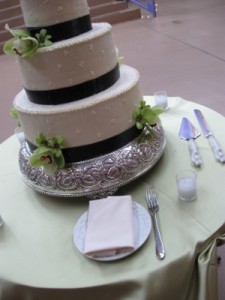 If having high quality photos of your entire wedding and reception is not your first priority, you can ask a friend or relative to document the day for you. Someone with good photography equipment can probably take decent photos for you.
If having high quality photos of your entire wedding and reception is not your first priority, you can ask a friend or relative to document the day for you. Someone with good photography equipment can probably take decent photos for you.
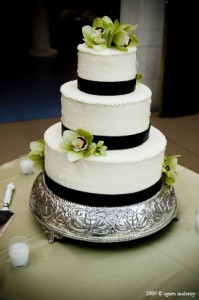 But if having professional quality photos is important, it’s difficult to get them without paying professional prices. Professional wedding photographers have equipment and skills that ordinary mortals lack. The best consistently take copious, excellent photos that capture the essence of your day. They are on the spot and work hard so they don’t miss any important moments. It’s also important that they are not guests, but are hired to work for the entire time, so they will be alert and sober until the time they leave. They know what to look for and how to take good (and often stunning) photos of your wedding.
But if having professional quality photos is important, it’s difficult to get them without paying professional prices. Professional wedding photographers have equipment and skills that ordinary mortals lack. The best consistently take copious, excellent photos that capture the essence of your day. They are on the spot and work hard so they don’t miss any important moments. It’s also important that they are not guests, but are hired to work for the entire time, so they will be alert and sober until the time they leave. They know what to look for and how to take good (and often stunning) photos of your wedding.
If you have a friend or relative take photos, they may or may not have the same equipment. Unless they are professionals or truly talented amateurs, they probably don’t have the same skills. And you won’t know until the wedding day if they will be paying attention (and sober) for the whole evening. At some point, a friend or relative is going to stop working and start enjoying the party, which is an option a paid professional doesn’t have.
As with all DIY projects, think this one through before you make a decision. There is a definite difference in quality between amateur and professional photos. Decide what is important to you, and then pay a professional if you can’t live without those photos.
 If having high quality photos of your entire wedding and reception is not your first priority, you can ask a friend or relative to document the day for you. Someone with good photography equipment can probably take decent photos for you.
If having high quality photos of your entire wedding and reception is not your first priority, you can ask a friend or relative to document the day for you. Someone with good photography equipment can probably take decent photos for you. But if having professional quality photos is important, it’s difficult to get them without paying professional prices. Professional wedding photographers have equipment and skills that ordinary mortals lack. The best consistently take copious, excellent photos that capture the essence of your day. They are on the spot and work hard so they don’t miss any important moments. It’s also important that they are not guests, but are hired to work for the entire time, so they will be alert and sober until the time they leave. They know what to look for and how to take good (and often stunning) photos of your wedding.
But if having professional quality photos is important, it’s difficult to get them without paying professional prices. Professional wedding photographers have equipment and skills that ordinary mortals lack. The best consistently take copious, excellent photos that capture the essence of your day. They are on the spot and work hard so they don’t miss any important moments. It’s also important that they are not guests, but are hired to work for the entire time, so they will be alert and sober until the time they leave. They know what to look for and how to take good (and often stunning) photos of your wedding.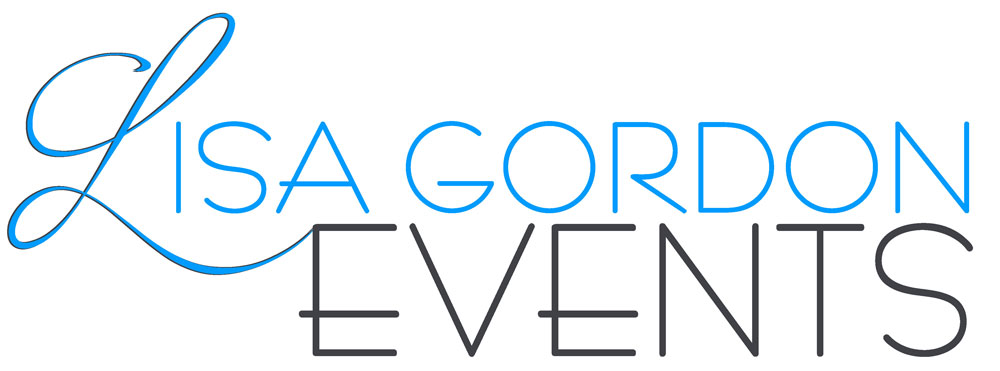









Recent Comments